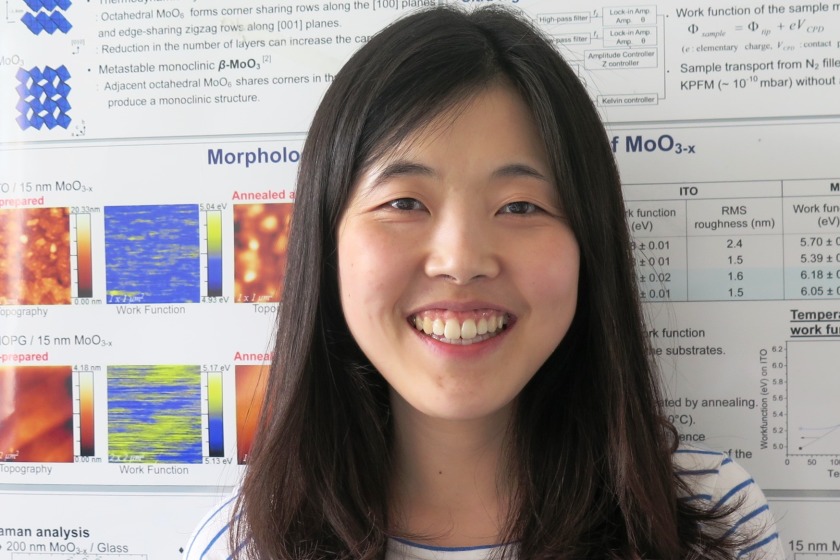Poster Award for HZB-Postdoc at EMRS Spring Meeting

Ah Reum Jeong has completed her PhD in physics at Ewha Womans University in Seoul, Korea. She now works as a postdoc in the Hybrid Material Systems & Nano-Analytics team of Dr. Marin Rusu.
During the spring meeting 2015 of the European Materials Research Society the Poster contribution of Dr. Ah Reum Jeong (HZB-Institute for Heterogeneous Material Systems) was selected for an award. The young scientist has presented results on electronic and structural properties in relation to chemical composition of molybdenum oxide layers, which are widely applied in photovoltaic as well as optoelectronic devices.
During the spring meeting 2015 of the European Materials Research Society the Poster contribution of Dr. Ah Reum Jeong (HZB-Institute for Heterogeneous Material Systems) was selected for an award. The young scientist has presented results on electronic and structural properties in relation to chemical composition of molybdenum oxide layers, which are widely applied in photovoltaic as well as optoelectronic devices.
Ah Reum Jeong has completed her PhD in physics at Ewha Womans University in Seoul, Korea. She now works as a postdoc in the Hybrid Material Systems & Nano-Analytics team of Dr. Marin Rusu in the Hybrid-PV-Project. „There are still relevant processes in molybdenum oxide which we do not completely understand yet“, she states.
In her research, she modifies MoO3-layers with defects and analyzes its morphology, structure and work functions at different temperatures by Kelvin probe force microscopy in ultra-high vacuum and Raman spectroscopy. Chemical composition of the films was in addition analyzed by x-ray photoelectron spectroscopy measurements under the guidance of Prof. Dr. Marcus Bär.
„At first I wasn’t aware that among the people surrounding my poster one person was a member of the jury“, Ah Reum Jeong says. „He has asked some quite specific questions and we had a very good discussion. I am really happy about this award since it helps to get even more attention for our work in the scientific community.”
„Ah Reum Jeong has convinced the jury with the scientific quality of her work and with a very clear presentation “, Marin Rusu states. The poster has been presented at the Symposium "Synthesis, processing and characterization of nanoscale multi functional oxide films".
More Information: EMRS-2015 Spring Meeting and Exhibition, Lille (France) has taken place from May 11-15, 2015
arö
https://www.helmholtz-berlin.de/pubbin/news_seite?nid=14213;sprache=en
- Copy link
-
Element cobalt exhibits surprising properties
The element cobalt is considered a typical ferromagnet with no further secrets. However, an international team led by HZB researcher Dr. Jaime Sánchez-Barriga has now uncovered complex topological features in its electronic structure. Spin-resolved measurements of the band structure (spin-ARPES) at BESSY II revealed entangled energy bands that cross each other along extended paths in specific crystallographic directions, even at room temperature. As a result, cobalt can be considered as a highly tunable and unexpectedly rich topological platform, opening new perspectives for exploiting magnetic topological states in future information technologies.
-
MXene for energy storage: More versatile than expected
MXene materials are promising candidates for a new energy storage technology. However, the processes by which the charge storage takes place were not yet fully understood. A team at HZB has examined, for the first time, individual MXene flakes to explore these processes in detail. Using the in situ Scanning transmission X-ray microscope 'MYSTIIC' at BESSY II, the scientists mapped the chemical states of Titanium atoms on the MXene flake surfaces. The results revealed two distinct redox reactions, depending on the electrolyte. This lays the groundwork for understanding charge transfer processes at the nanoscale and provides a basis for future research aimed at optimising pseudocapacitive energy storage devices.
-
Bernd Rech elected to the BR50 Board of Directors
The Scientific Director at Helmholt-Zentrum Berlin is the new face behind the "Natural Sciences" unit at Berlin Research 50 (BR50). Following the election in December 2025, the constituent meeting of the new BR50 Board of Directors took place on 22 January 2026.
Its members are Michael Hintermüller (Weierstrass Institute, WIAS), Noa K. Ha (German Centre for Integration and Migration Research, DeZIM), Volker Haucke (Leibniz Research Institute for Molecular Pharmacology, FMP), Uta Bielfeldt (German Rheumatism Research Centre Berlin, DRFZ) and Bernd Rech (HZB).
